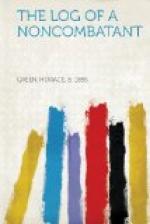Nevertheless, I think these notes present a point of view which ought to be known, if only for the purpose of showing the other side of the shield—and of checking, to some extent, the nursery tales in regard to personal atrocities, which become more fanciful the farther they are told from the scene of reported occurrence. After the horrible Lusitania crime and other evidences of German Schrecklichkeit for which there can be no justification, it is hard for Americans to reason fairly in questions involving Teutonic methods of warfare. I am therefore appending the notes in spite of a rather careful study of the Bryce Report on German atrocities in Belgium. They are, of course, to be taken into consideration merely as the evidence of what one man happened to see or as was often more the case, not to see.
In order that there may be no misunderstanding, it is well to define the meaning of the word “atrocity.”
I suppose all will agree with me that the term does not include what may be called the necessary horrors of war—such as hunger and poverty resulting from the destruction of homes and loss of livelihood, the suffering of refugees driven by necessity from captured towns, starvation through no fault of the invader, the accidental wounding of noncombatant peasants, farmers, etc. For the present purpose the word is intended to include all cases of unnecessary, unprovoked personal cruelty, as well as, of course, the outraging of women. Such acts, for example, as the reported gouging-out of the eyes of prisoners, cutting off the wrists of children, the alleged stabbing of old women, cutting off the wrists and ears of nurses, and the more refined cruelties of which I have heard reports, are, it goes without saying, atrocities. Let us examine one or two of these.
Near Osnabruck, Germany, an American visitor, pacing up and down a railroad siding early one morning, chewing a mouthful of stale sausage meat between thick crusts of rye bread, heard a particular cruelty story which may be used here as an example. It was told by an army surgeon with whom he was having his peripatetic breakfast. On the track alongside stood a so-called Red Cross train, consisting of a combination of well-equipped hospital coaches with their triple rows of berths slung one above the other as in a sleeper; attached in the rear were a few coal carriages and freight trucks. This train was waiting for the outbound traffic to pass by. You see, the outbound traffic consisted of fresh troops, being rushed to the front in one of those quick transcontinental shifts which have played so important a part in German strategy. But the eastbound train carried only wounded and dying on their way back home. So, of course, the hospital cars must wait as long as necessary, since they had no right or standing in the ruthless game called war.




